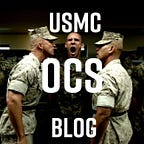Getting to OCS, Part I: Application and OSO
Part I — First Contact: What to Expect When You Talking to an OSO for the First Time
So you’ve decided you might be interested in becoming an officer in the Marine Corps. You’ve avoided the pull of the other branches, and you’ve done at least a little research into what Marine Officers do. What do you do next?
If you’re not sure where your local Officer Selection Station is, you can visit Marines.com and submit a request for information. You can also contact them by phone, or enter ‘USMC Officer Selection Station’ and talk to someone in person. Regardless of whether you reach out through email, by phone, or in person, the most important thing to do is talk to actual Marines. Officer Selection Officers (OSOs) have been to OCS, and they usually come from a multitude of backgrounds, so they’ll be able to answer any questions you might have — and if they don’t they’ll know someone who does.
What to know before your first meeting
If you reached out through email, or you submitted a request for information, you’ll likely have received the following information: a ‘basic screening questionnaire’, which the OSO will use to gauge your relative competitiveness for the various Officer Selection Programs and an ‘MOS Handbook’.
First, complete the questionnaire. The form should be relatively easy to complete, and differs little from many scholarship and school applications. It will ask you questions about your personal information, grades, leadership experiences, and any medical issues. It will also contain a section on ‘interaction with law enforcement that resulted in a citation, court date, conviction, and/or jail time’ and drug use. Perhaps the most important part of the application process is do not lie on any of your forms. This may seem self-explanatory, but many potentially great Marine Officers have been pushed out of the process because they lied on their forms about drug use or run-ins with law-enforcement. This means if you smoked anything other than tobacco, list it. If you got a drinking citation in high school, list it.
While filling out the screening questionnaire, it’s also a good idea to download your score reports from ACT and SAT, you’ll need them at a later stage in the process. You can download SAT scores directly from College Board and you can download ACT scores by accessing your account on the ACT website and viewing the ‘printer-friendly’ version of your report.
Once you’ve completed this form, take a look at the MOS Handbook. Though you’ll likely have an idea of what you want to do already, you won’t get to determine your MOS for a while. Picking an MOS will give your OSO a better idea of your goals and motivations and enable them to better help you become a Marine Officer.
Next: In-Person Meeting
After you’ve turned these in, your OSO will arrange for you to meet in-person. The exact approach of each OSO varies, but I’ll provide a brief account of my meeting in the next post, including: What questions you’ll likely be asked, what documents you’ll be asked to fill out, and a few tips and tricks to help you do so as quickly and effectively as possible.
